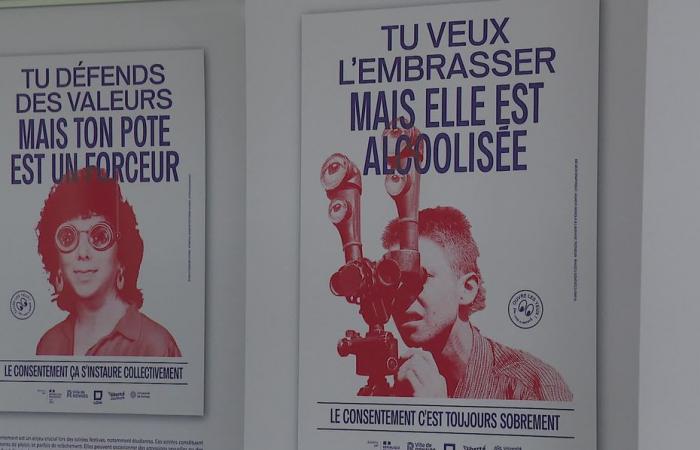
Because after the Rennes student evenings, there were too many complaints of sexual assault or rape, the public authorities decided to support a communication campaign on consent. “It feels good when we can talk about it in a dispassionate way, when it’s not a hot topic,” explains Thomas Guiheneuc of the Rennes association Liberté Couleurs, asked to lead this campaign.
Company
From daily life to major issues, discover the subjects that make up local society, such as justice, education, health and family.
France Télévisions uses your email address to send you the “Society” newsletter. You can unsubscribe at any time via the link at the bottom of this newsletter. Our privacy policy
“Consent? It necessarily involves a question” tells us this Staps student, sitting on a deckchair, in the middle of the campus of the University of Rennes 2. At his side, two friends. One says that it is sometimes complicated with alcohol: “during the evenings, some people think that everyone is having fun, that everyone is OK with everything, that everyone goes at the same pace and wants the same things, when not at all“. The other young woman explains that she regularly talks about consent and what happens in the evening : “we talk between friends, especially after parties when things happen to us, but it can also be very taboo“.
READ. How can the notion of consent and “rape culture” evolve thanks to the Mazan trial?
So that the subject of consent is no longer a taboo, Thomas Guiheneuc, co-founder of the Rennes association Freedom Colors runs workshops. That lunchtime, he tested an interactive game again with around twenty students from the IUT Carrières sociale on the Beaulieu campus in Rennes. It’s a card game called “Does it match or not?”. There is a character, Loulou, who will act or react depending on a given situation. A student takes charge of the game and explains the situation: “Loulou is drunk, her partner offers her a sexual practice. How does Loulou react and what will she do? “The students present their arguments. Some are shocked, others happy… Gwenaëlle finds the exchanges interesting: “we see that we are not all equal and that we do not have the same reactions on certain things, it’s a little unexpected“. Thomas Guiheneuc asks the question that bothers some: “have you ever talked about this type of situation with your partners? (...) Why wait for them to come forward to talk about it?”
READ. Consent: how to talk to young people about it?
It is to dispel these possible misunderstandings and better understand everyone’s reactions that a communication campaign was launched in Rennes. It is supported by the Rectorate, the prefecture, the Rennes Metropolis and the Liberté Couleurs association, and initiated by the Rennes prosecutor who noted that numerous complaints were filed for rape or sexual assault during student parties. However, in these legal proceedings, the materiality of the facts is often established, but the moral element of the offense, that is to say proof of lack of consent, is regularly lacking, leading to dismissals. (For “insufficiently characterized offense“).
For Thomas Guiheneuc, young people are animated by the subject of consent, but during these workshops, he tries to get them to go further.
I ask them: concretely, in your relationship with your friends, have you ever found yourself in a situation, where you finally said yes, because it was easier, did you already asked the question of your position on consent? And there, we realize that it is not so simple, that there is a real vagueness in everyone’s posture regularly.
Thomas Guiheneuc,co-founder of the Liberté Couleurs association
He also reassures the boys. He tells them they are not targets. He advises them to simply have consideration for others, whether in a group of friends, with their partners: “there are plenty of indicators, looks, postures, words, attitudes and that’s what’s important“.
He would like the education code to be respected, with three workshops per year from CP to high school. “we wouldn’t be there“, he regrets. While waiting for truly compulsory courses in all schools, the Minister of Justice suggested a few days ago that he was in favor of including the notion of consent in the code penal. A step forward for all these young people.





